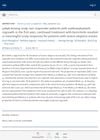 March 2024 in “Clinical and experimental dermatology”
March 2024 in “Clinical and experimental dermatology” Topical corticosteroids may be a safe and effective treatment for severe alopecia areata in children.
 August 2023 in “International journal of research in dermatology”
August 2023 in “International journal of research in dermatology” Janus kinase inhibitors are effective and generally safe for treating hair loss in adults with alopecia areata.
 June 2023 in “Dermatology and therapy”
June 2023 in “Dermatology and therapy” The Middle East and Africa need better data, treatment consensus, and support for Alopecia Areata.

Baricitinib is a new, effective treatment for advanced alopecia areata but is costly and has risks.
 September 2022 in “Skin appendage disorders”
September 2022 in “Skin appendage disorders” Seborrheic dermatitis may contribute to the development of central centrifugal cicatricial alopecia.
 40 citations,
December 2019 in “Neurobiology of Stress”
40 citations,
December 2019 in “Neurobiology of Stress” Neuroactive steroids show promise for treating mental and neurological disorders by targeting GABA_A receptors.
 2 citations,
September 2015 in “Clínica e Investigación en Arteriosclerosis”
2 citations,
September 2015 in “Clínica e Investigación en Arteriosclerosis” Some skin conditions may increase the risk of heart disease, but are not yet included in cardiovascular prevention guidelines.
 1 citations,
September 2023 in “Journal of drugs in dermatology”
1 citations,
September 2023 in “Journal of drugs in dermatology” Alopecia areata causes unpredictable hair loss and emotional distress, with no cure and limited treatment options.
 1 citations,
June 2023 in “Advances in therapy”
1 citations,
June 2023 in “Advances in therapy” Ripretinib is effective and safe for treating advanced GIST in Chinese patients, particularly for non-gastric GISTs.
 1 citations,
January 2023 in “Przegląd Dermatologiczny”
1 citations,
January 2023 in “Przegląd Dermatologiczny” The Polish Society of Dermatology recommends treatments for alopecia areata that vary by severity, including topical and systemic medications, with long-term maintenance important for management.
 1 citations,
October 2021 in “Deleted Journal”
1 citations,
October 2021 in “Deleted Journal” Dupilumab can help regrow hair and improve skin conditions in patients with severe atopic dermatitis and alopecia areata.
 1 citations,
April 2018 in “Revista da Sociedade Portuguesa de Dermatologia e Venereologia”
1 citations,
April 2018 in “Revista da Sociedade Portuguesa de Dermatologia e Venereologia” Hidradenitis suppurativa is a chronic skin condition more common in women, linked to genetics and lifestyle factors, and associated with various other health issues.
 October 2024 in “Journal of Education Health and Sport”
October 2024 in “Journal of Education Health and Sport” Alopecia areata treatment should be personalized, using topical or systemic therapies based on severity, with promising options like JAK inhibitors needing more research.
 April 2024 in “Frontiers in medicine”
April 2024 in “Frontiers in medicine” Alopecia Areata significantly lowers quality of life and current treatments are inadequate, highlighting a need for better therapies and standardized treatment protocols.
 April 2024 in “Dermatology and therapy”
April 2024 in “Dermatology and therapy” There are significant gaps and inconsistencies in diagnosing and treating alopecia areata in Greece and Italy.
 February 2024 in “International neuropsychiatric disease journal”
February 2024 in “International neuropsychiatric disease journal” Alopecia areata severely impacts quality of life, mental health, and work productivity.
 June 2023 in “Dermatology and therapy”
June 2023 in “Dermatology and therapy” Doctors in the Middle East need better treatments and more knowledge about new therapies for hair loss condition Alopecia Areata.
 January 2017 in “Chemistry & Industry”
January 2017 in “Chemistry & Industry” Eating fewer calories may slow aging and removing old cells can increase lifespan in mice.
 January 2015 in “Side effects of drugs annual”
January 2015 in “Side effects of drugs annual” The document concludes that sex hormones and related compounds have various effects on health, with both potential benefits and risks.
 September 2024 in “Journal of the American Academy of Dermatology”
September 2024 in “Journal of the American Academy of Dermatology” Continued baricitinib treatment leads to significant scalp hair regrowth in severe alopecia areata patients.
 January 2024 in “JEADV clinical practice”
January 2024 in “JEADV clinical practice” The study helps doctors use patient images to understand and apply SALT scores for treating severe alopecia areata.
 January 2023 in “Journal of The American Academy of Dermatology”
January 2023 in “Journal of The American Academy of Dermatology” Baricitinib helped most teenagers with severe hair loss regrow hair and had mild side effects.
 6 citations,
February 2023 in “Journal of the American Academy of Dermatology”
6 citations,
February 2023 in “Journal of the American Academy of Dermatology” Upadacitinib improved hair regrowth and quality of life in alopecia areata patients with minimal side effects.
 1 citations,
March 2023 in “Skin”
1 citations,
March 2023 in “Skin” Baricitinib helps patients with severe alopecia areata regrow hair.
 September 2022 in “Plastic and Reconstructive Surgery”
September 2022 in “Plastic and Reconstructive Surgery” Baricitinib helps with severe hair loss, negative-pressure therapy lowers hernia recurrence, tranexamic acid reduces bleeding, robot-assisted breast surgery may improve outcomes, and acellular dermal matrix could decrease breast reconstruction complications.
22 citations,
August 2021 in “Frontiers in medicine” Immune cells in Hidradenitis suppurativa become more inflammatory and may be important for treatment targets.
 October 2023 in “Frontiers in Medicine”
October 2023 in “Frontiers in Medicine” Dupilumab helped a 4-year-old grow hair back after another treatment failed.
 September 2023 in “Dermatology and Therapy”
September 2023 in “Dermatology and Therapy” Baricitinib effectively regrows hair in most people with severe alopecia, especially those with patchy hair loss, but hair may fall out again if treatment stops.
15 citations,
December 2021 in “Pharmaceutics” The study found key factors in the cause of hidradenitis suppurativa, its link to other diseases, and identified existing drugs that could potentially treat it.
8 citations,
June 2021 in “Annals of internal medicine” Experts recommend a team-based approach to treat patients with long-lasting COVID-19 symptoms and emphasize the need for ongoing research.


























